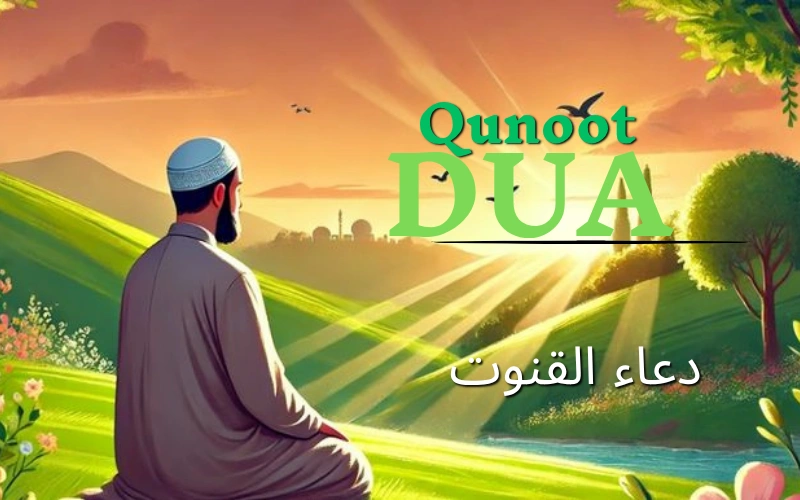In the daily spiritual practice of Muslims, Dua Qunoot holds a special place. This heartfelt supplication is recited during Witr prayer, especially in the last rak’ah (unit of prayer). Derived from the word “Qunoot,” which means obedience and devotion, this dua reflects humility, faith, and total dependence on Allah.
Whether you’re a beginner learning Salah or someone seeking a deeper understanding of this powerful dua, this guide will help you grasp the meaning, method, and benefits of Dua Qunoot, with Arabic script, Roman Urdu transliteration, and Hindi translation.
What is Dua Qunoot?
Dua Qunoot is a special supplication made during Witr prayer, which is part of the Tahajjud or Isha prayer. It is commonly recited in the final rak’ah after the ruku (bowing), although some scholars permit reciting it before ruku.
It is known for its beautiful and comprehensive message — seeking Allah’s guidance, forgiveness, mercy, and protection from misguidance and evil.
When and How to Recite Dua Qunoot
When to Recite It
-
During Witr Salah: Specifically in the last rak’ah (usually third) of Witr, after saying “Subhana Rabbiyal Azeem” and standing back up.
-
Occasional Use: It is also permissible to recite it during times of calamity (Qunoot-e-Naazilah), as practiced by the Prophet Muhammad ﷺ.
How to Recite It (Step-by-Step)
-
Perform Isha prayer, then stand for Witr (1, 3, 5, or more rak’ahs).
-
In the last rak’ah, after the bowing (ruku), stand up.
-
Raise your hands (optional based on school of thought).
-
Recite Dua Qunoot with sincerity and focus.
-
Continue with the rest of the prayer.
Dua Qunoot in Arabic, Transliteration, and Hindi Translation
Below is the complete text of Dua Qunoot along with Roman Urdu transliteration and Hindi meaning.
| Format | Dua Qunoot Content |
|---|---|
| Arabic | اللَّهُمَّ اهْدِنِي فِيمَنْ هَدَيْتَ، وَعَافِنِي فِيمَنْ عَافَيْتَ، وَتَوَلَّنِي فِيمَنْ تَوَلَّيْتَ، وَبَارِكْ لِي فِيمَا أَعْطَيْتَ، وَقِنِي شَرَّ مَا قَضَيْتَ، فَإِنَّكَ تَقْضِي وَلَا يُقْضَى عَلَيْكَ، وَإِنَّهُ لَا يَذِلُّ مَنْ وَالَيْتَ، وَلَا يَعِزُّ مَنْ عَادَيْتَ، تَبَارَكْتَ رَبَّنَا وَتَعَالَيْتَ. |
| Roman Urdu | Allahumma ihdini fiman hadayta, wa ‘aafini fiman ‘aafayta, wa tawallani fiman tawallayta, wa baarik li fima a’tayta, wa qini sharra ma qadayta, fa innaka taqdi wa la yuqdaa ‘alayk, wa innahu laa yadhillu man waalayta, wa laa ya’izzu man ‘aadayta, tabaarakta Rabbana wa ta’aalayta. |
| Hindi Translation | हे अल्लाह! मुझे उन लोगों में शामिल कर जिन्हें तूने हिदायत दी, मुझे उन लोगों के साथ आफ़ियत दे जिन्हें तूने आफ़ियत दी, मेरी देखभाल कर जैसे तूने औरों की देखभाल की, जो कुछ तूने दिया उसमें मेरे लिए बरकत कर, और मुझे उस चीज़ के शर से बचा जिसे तूने मुक़र्रर किया। क्योंकि तू फैसला करता है और कोई तुझ पर फैसला नहीं कर सकता। और तू जिसे दोस्त बना ले वह कभी अपमानित नहीं होता और जिसे तू दुश्मन बना ले उसे कोई इज्ज़त नहीं दे सकता। ऐ हमारे रब! तू बरकत वाला है, तू बहुत बुलंद है। |
Meaning and Explanation of Dua Qunoot
Let’s understand the meaning of each segment of this dua:
-
اللَّهُمَّ اهْدِنِي فِيمَنْ هَدَيْتَ
“O Allah, guide me among those whom You have guided.”
➤ We ask Allah to include us among those whom He has shown the right path. -
وَعَافِنِي فِيمَنْ عَافَيْتَ
“And grant me well-being among those You have granted well-being.”
➤ We ask for physical, spiritual, and emotional wellness. -
وَتَوَلَّنِي فِيمَنْ تَوَلَّيْتَ
“Take me into Your charge with those whom You have taken into Your charge.”
➤ We seek Allah’s special care and protection. -
وَبَارِكْ لِي فِيمَا أَعْطَيْتَ
“And bless me in what You have given.”
➤ Whatever Allah has given us, we ask for barakah (blessings) in it. -
وَقِنِي شَرَّ مَا قَضَيْتَ
“And protect me from the evil of what You have decreed.”
➤ We accept His decree but seek safety from any harm it may bring. -
فَإِنَّكَ تَقْضِي وَلَا يُقْضَى عَلَيْكَ
“For surely, You decree and none can pass decree upon You.”
➤ Acknowledgement of Allah’s supreme power and authority. -
وَإِنَّهُ لَا يَذِلُّ مَنْ وَالَيْتَ
“And he is not humiliated whom You have befriended.”
➤ Those close to Allah are never truly disgraced. -
وَلَا يَعِزُّ مَنْ عَادَيْتَ
“Nor is he honored who is Your enemy.”
➤ Honor comes only through Allah’s approval. -
تَبَارَكْتَ رَبَّنَا وَتَعَالَيْتَ
“Blessed are You, our Lord, and Exalted.”
➤ A final glorification of Allah’s name and status.
Benefits of Reciting Dua Qunoot
-
✅ Strengthens Connection with Allah – Builds a habit of calling upon Him sincerely in prayer.
-
✅ A Complete Supplication – It covers guidance, health, protection, and divine blessings.
-
✅ Taught by the Prophet ﷺ – It’s authentically reported in Hadith (e.g., Sunan Abi Dawud, Tirmidhi).
-
✅ Ideal for Night Prayers – Enhances the spirituality of Witr and Tahajjud prayers.
Tips for Memorizing Dua Qunoot
-
📌 Break it Down: Divide into short lines and learn one line per day.
-
🎧 Listen to Recitations: Audio tracks help with pronunciation and retention.
-
📝 Use Roman Transliteration: Ideal for beginners unfamiliar with Arabic.
-
🤲 Practice in Salah: Reciting in real prayer strengthens memory through repetition.
-
📖 Understand the Meaning: Meaningful connection makes memorization easier.
Conclusion
Dua Qunoot is a gem among Islamic supplications — short, beautiful, and immensely powerful. Whether you’re performing Witr during Ramadan or including it in daily prayers, understanding and reciting this dua can elevate your worship experience.
May Allah grant us the ability to recite it with sincerity and implement its meanings in our daily lives. Ameen.
